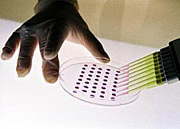
The US House of Representatives passed HR 3 Thursday, which would amend the Public Health Service Act to allow for additional embryonic stem cell research. In a press release issued after passage, the White House characterized embryonic stem cells as human life, and promised to veto the bill. President Bush’s first veto in office came this past summer, when he vetoed another embryonic stem cell research bill. Bill supporters had hoped that midterm elections would make the bill veto-proof, but Thursday’s 253-174 vote is still short of the required two-thirds majority.
"While it's not enough to override a veto, it's enough to show we have tremendous momentum," said Rep. Diana DeGette, D-Colo., who spearheaded the House effort with Rep. Michael Castle, R-Del. With the Senate near having the two-thirds majority needed to override a veto, DeGette suggested that it is time for the president to begin negotiating with Congress over compromise language. In 2001, Bush limited federal funding for research on embryonic stem cells to the then existing lines, of which only 21 remain viable. Researchers say that many of these lines are contaminated, and are not very useful, while research from 300 newer lines that were obtained from unused embryos destined to be thrown away from fertility clinics show far more promise. The House-based bill would expand that pool of available cells to include those from any of the thousands of embryos that are discarded by fertility clinics each year, as long as those cells were freely donated for research by the parents. It would also impose some of the country's first ethics rules on embryo research.The vote came after about three hours of impassioned speeches by members on both sides of the issue. Rep. Roscoe Bartlett, R-Md., spoke up for alternative methods of obtaining stem cells. "The assumption by many people that you have to kill human embryos to get embryonic stem cells just isn't true," Bart-lett said. |





